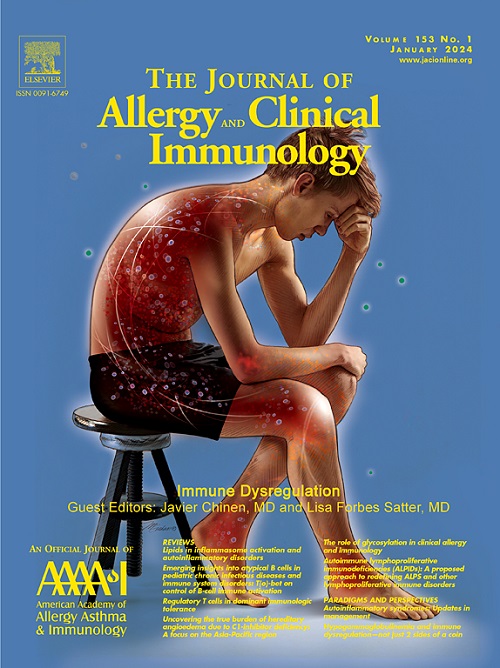Inhibition of lysosomal degradation increases expression of mutant ADA2 in DADA2 monocytes
IF 11.2
1区 医学
Q1 ALLERGY
引用次数: 0
Abstract
Background
Deficiency of adenosine deaminase 2 (DADA2) is an inborn error of immunity causing vasculitis and bone marrow failure. Bone marrow failure is mostly unresponsive to TNF-α inhibitors. The limited understanding of the pathomechanisms driving the disease impedes the development of new treatment options. Unlike cellular model systems expressing pathogenic ADA2 variants, primary monocytes from patients with DADA2 lack ADA2 protein expression.
Objectives
This study aimed to analyze the role of protein degradation in the pathogenesis of DADA2 and the therapeutic potential of the lysosomotropic drug hydroxychloroquine in the treatment of patients with DADA2.
Methods
ADA2 protein expression in CD14+ monocytes from healthy controls (n = 8) and patients with DADA2 (n = 11) was determined by Western blot after inhibition of lysosomal and proteasomal degradation, as well as after hydroxychloroquine treatment in vivo in 1 patient with DADA2. Lipidation of microtubule associated protein 1 light chain 3 beta (LC3B) was analyzed as a measure of autophagic activity. Clinical and laboratory data were recorded in cytopenic patients with DADA2 treated with hydroxychloroquine, 200 mg per day.
Results
We demonstrated that inhibition of lysosomal degradation restores ADA2 protein expression in DADA2 monocytes in vitro. DADA2 monocytes exhibited increased autophagic activity. We observed clinical improvement in 2 cytopenic patients with DADA2 who were treated with hydroxychloroquine, and we showed a concomitant increase in ADA2 protein levels in monocytes from one of these patients in vivo.
Conclusion
We identified lysosomal protein degradation of ADA2 as a pathomechanism of DADA2 and introduced hydroxychloroquine as a potential treatment option in patients with DADA2 with refractory cytopenia.

抑制溶酶体降解可增加突变ADA2在DADA2单核细胞中的表达。
背景:腺苷脱氨酶2 (DADA2)缺乏是一种先天性免疫错误,可引起血管炎和骨髓衰竭。骨髓衰竭大多对肿瘤坏死因子- α抑制剂无反应。对驱动疾病的病理机制的有限理解阻碍了新治疗方案的发展。与表达致病性ADA2变异的细胞模型系统不同,来自DADA2患者的原代单核细胞缺乏ADA2蛋白的表达。目的:本研究旨在分析蛋白质降解在DADA2发病机制中的作用,以及溶酶体药物羟氯喹治疗DADA2患者的治疗潜力。方法:采用western blot方法检测1例DADA2患者体内溶酶体和蛋白酶体降解抑制及羟氯喹治疗后,健康对照(n=8)和DADA2患者(n=11) CD14+单核细胞中ADA2蛋白表达。微管相关蛋白1轻链3 β (LC3B)脂化分析作为自噬活性的量度。记录了2例使用200 mg/d羟氯喹治疗的DADA2细胞减少性患者的临床和实验室数据。结果:我们证明了抑制溶酶体降解可以恢复DADA2单核细胞中ADA2蛋白的体外表达。DADA2单核细胞表现出增强的自噬活性。我们观察到两名接受羟氯喹治疗的细胞减少性DADA2患者的临床改善,并显示其中一名患者体内单核细胞中ADA2蛋白水平同时升高。结论:我们确定了ADA2溶酶体蛋白降解是DADA2的一种病理机制,并介绍了羟氯喹作为DADA2难治性细胞减少症患者的一种潜在治疗选择。
本文章由计算机程序翻译,如有差异,请以英文原文为准。
求助全文
约1分钟内获得全文
求助全文
来源期刊
CiteScore
25.90
自引率
7.70%
发文量
1302
审稿时长
38 days
期刊介绍:
The Journal of Allergy and Clinical Immunology is a prestigious publication that features groundbreaking research in the fields of Allergy, Asthma, and Immunology. This influential journal publishes high-impact research papers that explore various topics, including asthma, food allergy, allergic rhinitis, atopic dermatitis, primary immune deficiencies, occupational and environmental allergy, and other allergic and immunologic diseases. The articles not only report on clinical trials and mechanistic studies but also provide insights into novel therapies, underlying mechanisms, and important discoveries that contribute to our understanding of these diseases. By sharing this valuable information, the journal aims to enhance the diagnosis and management of patients in the future.

 求助内容:
求助内容: 应助结果提醒方式:
应助结果提醒方式:


